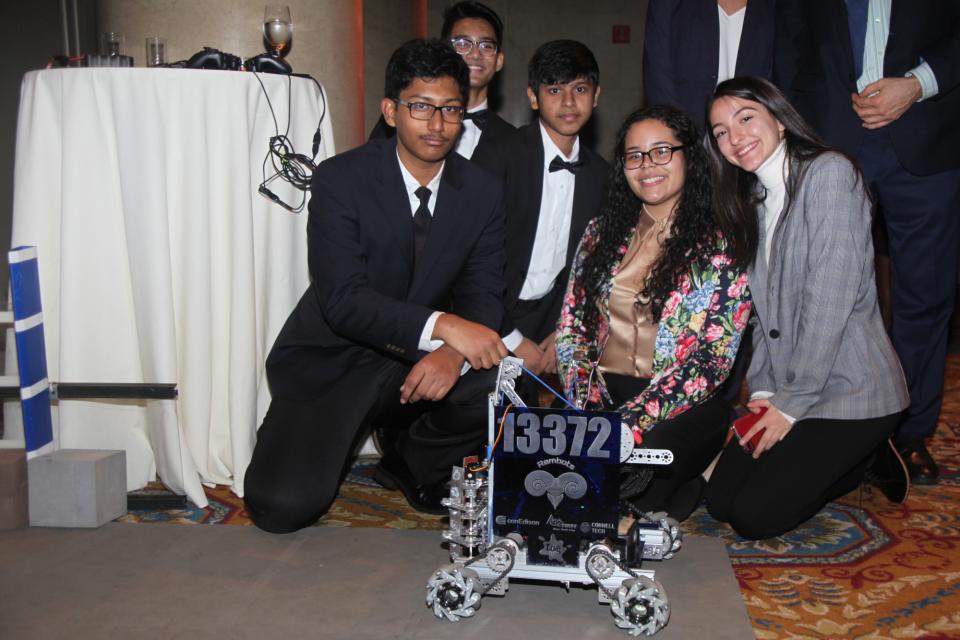Bezos Says Robots Won't Replace Humans; Ackman Wants a Massage
(Bloomberg) -- Did Bill Ackman, John Overdeck and David Siegel give a bunch of money to get kids building robots, only to see those kids displaced by machines when they grow up?
At a benefit for FIRST, the science and technology nonprofit they’ve supported, the answer was a resounding no, and it came from an authoritative source, Jeff Bezos, the guy who has more than 10,000 people working on Alexa, Amazon’s personal assistant voice service.
“It’s in my view very unlikely that machine intelligence and artificial intelligence will make humans have no jobs," Bezos said Thursday night in a “fireside chat” with Walter Isaacson at Cipriani Wall Street, as waiters in white jackets placed ricotta cheesecakes at each guests’ plate and poured just a bit more wine into their glasses. “Every piece of productivity increases our wealth as a society, and increases the jobs, and makes the jobs more interesting and higher quality.”
Bezos illustrated his point using Earth-moving equipment as an example. “We could have a lot of employment by getting rid of bulldozers,” he said. “You could get rid of the shovels and force people to dig with teaspoons. This would not make our society wealthier.”
Future Jobs
As for managing expectations about the future, Bezos praised science fiction writers for showing us what’s possible (though he noted the computer on the USS Enterprise could have had a more human-sounding voice), and dinged the rest of us on our predictive capabilities.
“We are so bad at imagining the future of jobs,” Bezos said. “A hundred years ago, if I said to you, ‘In the 21st century there’s going to be an occupation called massage therapist,’ you’d have laughed at me."
Funny thing is, massage therapist may be one of the jobs a robot can get paid to do, if Ackman has his say. During the cocktail hour, the founder of Pershing Square Capital said if he could have a robot do whatever he wanted, he’d have it deliver “massage on demand.”
Siegel, who serves on the board of FIRST, said he’d like a robot who could go to work in his place. He’d direct the robot from home, and maybe get to spend more time with his kids, one of whom is participating in FIRST’s robotics competition. Overdeck is waiting for a self-driving car.
Robotic Competition
Dean Kamen, the founder of FIRST (and the Segway’s inventor), said he’d like a robot that creates human organs for transplant purposes.
Noor Khalifa, an 11th grader on a FIRST robotics competition team at the Manhattan Center for Science and Mathematics in East Harlem, said she dreams of a robot that can detect cancer before it starts. Classmate Loren Baret said she wants one that will end hunger. Last year their team built a robot that had a color sensor to differentiate red and blue blocks, and a claw to move and stack objects. They made it to the second round.
Bezos said the best way to prepare kids for the future is give as many of them as possible access to the kind of experiences FIRST provides. “You’ve got to learn to learn,” Bezos said.
Amazon is doing its part with a new program called Amazon Future Engineer announced Thursday.
“The first thing we’re doing is we are funding a game that is going to teach people how to code,” Bezos said. They also plan to fund computer science classes in 2,000 high schools in mostly lower-income communities, as well as offer 100 four-year college scholarships with each recipient guaranteed an internship at Amazon, he said.
Bezos also imparted a parenting lesson he picked up from his mom: benign neglect. She was protective “in a good way” meaning she let her kids get into trouble and hurt themselves.
“I’m surprised I’m alive,” he said.
See also: After raising Jeff Bezos, his mom wants to help others raise kids
He recounted discovering an open garage door at an empty house that had been sold, down the street from where he grew up.
“I went into the garage, I was alone in there, and I realized that the circuit breaker panel was available to me and the big 220-volt outlet where you’d normally plug in a washing machine was available."
He turned off the circuit breaker, inserted two spoons into the outlet, “took a ball and tossed it against the spoons, so they would touch, and it created an impressive display of pyrotechnics.”
“I did this over and over,” he said. When he invited the neighbors to see this demonstration, "I got caught. You have to let kids endanger themselves a little bit."
To contact the reporter on this story: Amanda Gordon in New York at agordon01@bloomberg.net
To contact the editors responsible for this story: Pierre Paulden at ppaulden@bloomberg.net, Steven Crabill
For more articles like this, please visit us at bloomberg.com
©2018 Bloomberg L.P.



